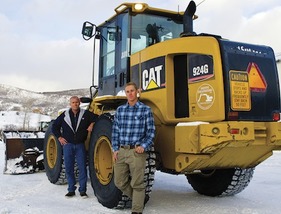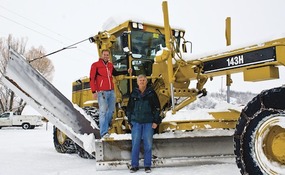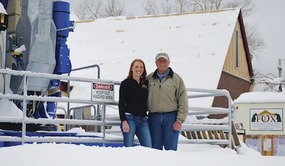Profile - Passing The Hard Hat
02/24/2013 02:55PM ● By Christina Freeman
Three generations of Grippas at Midwest Electric Systems.
Photography by Fred Grippa.
Steamboat Magazine talked with four businesses with long-term, inter-generational success in the Yampa Valley’s construction business. Here they share their trade secrets: projects they’re proud of, giving back to the community, and passing the hard hat to the next generation.
Native Excavating Inc.
Ed MacArthur started Native Excavating in 1981, with his wife, June. A rubber-tired backhoe was their first piece of equipment; it led to the business becoming one of the largest construction companies in Steamboat Springs by 2013. Completing an average of 120 projects per year, Native Excavating gives back equipment, time and money to the community, through projects like the Alpine Slide, Steamboat Springs Winter Sports Club’s weight room, the Bald Eagle Lake water ramps and the Nordic jump facility at Howelsen Hill. The MacArthurs’ son, Charlie, joined the business in 2007.
Digging the father-son team at Native Excavating: Ed MacArthur (left) and Charlie MacArthur.
Steamboat Magazine: You’ve done lots of municipal projects, from parking lots and roads to sewer systems and foundations, but ski jumps? That’s not a project most excavating companies have ever undertaken. What’s it like to work on the steep slopes of Howelsen Hill?
Ed MacArthur: Howelsen always provides a unique experience for the operators. Over the years we’ve had everything from large excavators to helicopters as our tool of choice, usually mixed with plenty of labor. After traveling up and down that hill enough times you pick up important tricks and techniques to make sure that the job gets done right.
SM: Your website, www.nativeexcavating.com, has images from some pretty amazing rural settings where you’ve worked. Have you seen lots of wildlife on the jobsite?
Ed MacArthur: We’ve had bears in our foundations, elk eat our erosion control, and plenty of moose walking around. Nothing out of the ordinary for Steamboat, but it’s incredible how little the wildlife seem to be bothered by our activities.
SM: We’ve been watching the new Casey’s Pond Senior Community start to take shape. It’s a huge project; is it the biggest one you’re working on right now?
Ed MacArthur: That’s one of our larger projects this year, but by no means anything out of the ordinary. We’ve developed great relationships with a number of general contractors and always enjoy being a part of their larger jobs.
SM: Bald Eagle Lake’s water ramps are gaining a reputation throughout Northwest Colorado as a wonderful summer amenity for up-and-coming aerialists, freestyle skiers and riders. What’s Native Excavating’s tie to these sports?
Ed MacArthur: Both Charlie and his younger brother, Daniel, participated in the Steamboat Springs Winter Sports club freestyle program for a number of years. The family got to know the coaches and staff there personally and has always enjoyed partnering with them to help all disciplines. Not every community is so lucky to have a world-class training club in its backyard and we’ll do just about anything to help them out.
SM: Charlie, You’re one of those rare individuals: a Steamboat native. How does the fact that you grew up in the community help you on the job?
Charlie McArthur: Being a Steamboat native certainly has led to relationships and connections within business. Though more importantly, I have the opportunity to help shape and give back to the community I grew up in. Steamboat natives are rare because it’s not an easy place to come back to and start a career. I’m very thankful for the opportunities within our company and that those opportunities allow me to live and work in one of the best places around.
Duckels Construction Inc.
Steamboat Springs was a small rural community in 1956 when Duckels Construction opened west of town. Founded by Thomas Duckels, the business is currently operated by his son, Fred. Grandson Derick is vice president of the company. Debbie Duckels, Fred’s daughter, was also involved with the business at one time. Duckels Construction specializes in roads and bridges, community infrastructure, excavation and general contracting.
Steamboat Magazine: The new promenade at the Steamboat Ski Area began garnering awards even before it was dedicated. It has transformed the base area from a summer ghost town to a popular place for tourists and locals. The cascading water features, grand staircase, meandering walkways, boulders and seating areas are so inviting. What was it like managing this project, which has quickly become a community showcase?
Derick Duckles: This is one of the best projects I've been a part of for many reasons. It involved both functional infrastructure and creative visual aspects. It provided a special opportunity to revamp an area of my hometown that is a focal point for residents and tourists alike. I am proud to be able to say I was involved in building this amenity that people of all ages, including my own children, can enjoy for years to come.
Two generations at Duckels Construction: Fred Duckels (right) with son Derick Duckels.
SM: The hoopla about the James Brown Soul Center of the Universe Bridge has died down in recent years, but when it was first given this unusual name in the ‘90s, it made national news. Is it the most famous project you’ve built?
Fred Duckels. It’s a pretty nice bridge. I remember following the whole controversy about its name, and going to watch James Brown at the dedication in 1993. The Howelsen Hill ski jumps — they’re notable too. They may not have garnered national attention for their name, but they’ve been showcased on sports broadcasts around the world.
SM: Fred, it’s not unusual to see you on the Steamboat slopes. Are moguls still your favorite runs?
Fred Duckels: All I ski are moguls — White Out’s my favorite. It’s got a nice fall line, and it’s always a challenge. There are those days when everything goes right, and I feel like I’ve died and gone to heaven.
SM: What are some of the challenging conditions you’ve faced working in the extreme climate of Northwest Colorado?
Fred Duckles: The cold is what you dread the most. We do a lot of bridges, often in the middle of winter because that’s when the water is constant. We were building the bridge over the Yampa River near the Hayden power plant when it was a record 61-below in Maybell. It wasn’t much warmer in Hayden. I don’t have any secrets for staying warm. There aren’t any, really. You just have to get out there and do it.
SM: For 57 years, Duckels Construction has been giving back to the community, not only in the form of monetary donations, but also in volunteer work and equipment. Can you name a few of those projects?
Fred Duckles: We have a gravel pit, and there’s a constant need for that among nonprofit organizations. We’ve also helped out with the Catholic church and building, and the Tread of Pioneers Museum, to name a few.
Midwest Electric Systems
Three generations of the Grippa family are involved in Midwest Electric Systems. Founder Bob Grippa opened the Steamboat Springs company in 1985, and his son, Fred, began working there in 1988. In turn, his sons, Vince and Chase, are part of the business.
Steamboat Magazine: Bob, we read recently that you’re retiring, but we still see you around the office. What are you doing in your spare time?
Bob Grippa: When I was a young man, I wondered why my parents got up so early. Well, I have become my parents. When I was running the company, I’d get up early and go into the office to do paperwork. I still get up early, but no paperwork! Now I go fishing in the summer. The only other thing I know how to do is help Fred around the office. I’m not tied down. I come in when I want and leave when I want. That way it doesn’t feel like work. I’ve started a knife-sharpening business to fill my spare time. After working for 50-plus years, it’s hard to sit around all day.
SM: Fred, you’re one of seven children. How did you come to be the one involved in the business?
Fred Grippa: Most of my siblings were much older than I was; I used to go to work with my dad from time to time and started liking electrical projects. I also got to spend a lot of time with him. I respected his work ethic and the fact that he never cut corners, but always tried to do the best job he could.
SM: Some people might say it’s hard when your dad is your boss. What’s it like when you’re working with both your dad and grandfather?
Vince Grippa: I’m very fortunate to work for the family business. It’s not an opportunity everyone gets. Working for my father and grandfather adds a new level of satisfaction to my work because not only am I accomplishing something I can be proud of, but I’m also making them proud. Being “the boss’s son” does come with a greater sense of responsibility, but the extra pressure just makes it that much more rewarding.
Chase Grippa: Honestly, my grandfather and father have been very good to me. I was raised well, with an involved family. Meeting their expectations and making them proud, doing my best wasn’t hard. I just had to be myself. My father is a book of knowledge when it comes to electricity. I’m blessed to work with my grandfather; not many people get that chance, and I get to see him every day. That’s really something. His wisdom is priceless.
SM: You worked on the Strings Music Pavilion. With all of its high-tech sound and lighting, that must have been a challenge. Is it the biggest community project you’ve done?
Fred Grippa: The Strings Pavilion was a great job, with all the tech work. But we’ve always done projects like this. Some of our more technical jobs include water and sewage treatment plants, Storm Mountain Ranch, Marabou, the Safeway ice cream plant in Denver and Elkhead Dam. The biggest were probably Howelsen Place and Alpenglow. They were in the $1.5 million range for electrical, which is pretty good for Steamboat.
SM: What’s your latest project?
Fred Grippa: We’re currently working on Smartwool, Windwalker Ranch and the Holy Name Catholic Church addition, among others.
Fox Construction
Tom and Karen Fox founded Fox Construction 33 years ago, shortly after moving to Steamboat Springs. After settling into Steamboat for a few years, they decided to start a family together. Today, they have three beautiful daughters, one of which is part of the family business. Their oldest daughter, Sarah, joined the business after graduating from CSU with her construction management degree, bringing her expertise in green building and the latest construction techniques and technology to the company. From Centennial Hall and the Howelsen Ice Rink to numerous private residences, many of Steamboat’s most iconic structures have been built by Fox Construction.
Steamboat Magazine: For years, the Steamboat barn (i.e. More Barn) was left to the whims of weather, but it once more stands, structurally sound, with Mount Werner as its backdrop. What was it like to work on this classic barn?
Tom Fox: Groups of people have been concerned about that barn for years. When we were finally able to get in there, it was interesting to see how well it really did hold up over the years. It was off-plumb by 18 degrees. We wondered, “Should we make it stand straight again?” We decided early on, absolutely not. That’s what everybody knows, so we kept it that way, but it was hard to do when you’re usually obsessed with making things perfect.
SM: Fox is known for building many classic Steamboat homes, from rough-hewn log structures to Arts & Crafts masterpieces. What are some of your favorites?
Tom Fox: It’s not as much the building as it is the character of its owner that makes a project a favorite. We’ve built our business based on service, whether that’s putting in a screen door on Grandma’s back porch or a $5 million custom home. I don’t really have a favorite style, but I do love the intricacies of building log homes.
SM: What has been the effect of the struggling local economy on green building efforts?
Sarah Fox-Behling: We’ve done both LEED-certified and Energy Star projects around town, and when comparing the two, there’s definitely a lot more work associated with getting LEED certification, which typically deters people from doing LEED-certified buildings. Especially with the down economy, many people prefer not to spend any additional money. However, as a company we still use a lot of the same green building principles in our day to day operations. We believe it’s just the right thing to do.
Tom Fox: In the last three or four years, because the economy has been really bad for construction, we’ve tried to help by using all American made products. It adds a bit to the square-foot cost, but we’ve had a lot of buy-in from owners wanting to help the economy. That approach is as popular as green building and has the same effect, in part by reducing transportation costs. It’s also patriotic.
SM: You’re not just an office team; you’re also teammates on the ice. How does that work, playing hockey together?
Tom Fox: That all started when we built the ice rink. Everyone skated out on the ice at the dedication ceremony, and I had to walk. My daughters said I should learn to skate, so I did. Now we have the Fox Construction hockey team which we play on together. Sarah, her husband Jeremy and I are all on the same team, which makes it a lot more fun.
SM: What’s it like to work with your daughter?
Tom Fox: Without Sarah, I wouldn’t have gone on. She was the impetus. Having her here is a wonderful thing. There’s never a dull moment in our company. Sarah has an 8-month old son, and my wife watches him so Sarah can work full time. It is truly a family business. We do things together outside of work as well. Sarah and her husband, Jeremy, are both student hot-air balloon pilots and Karen and I both have had our pilot licenses for a long time. Among other things, we also snowmobile, fish and scuba dive as a family.
Fox Construction's father-daughter team: Sarah Fox-Behling and Tom Fox.



